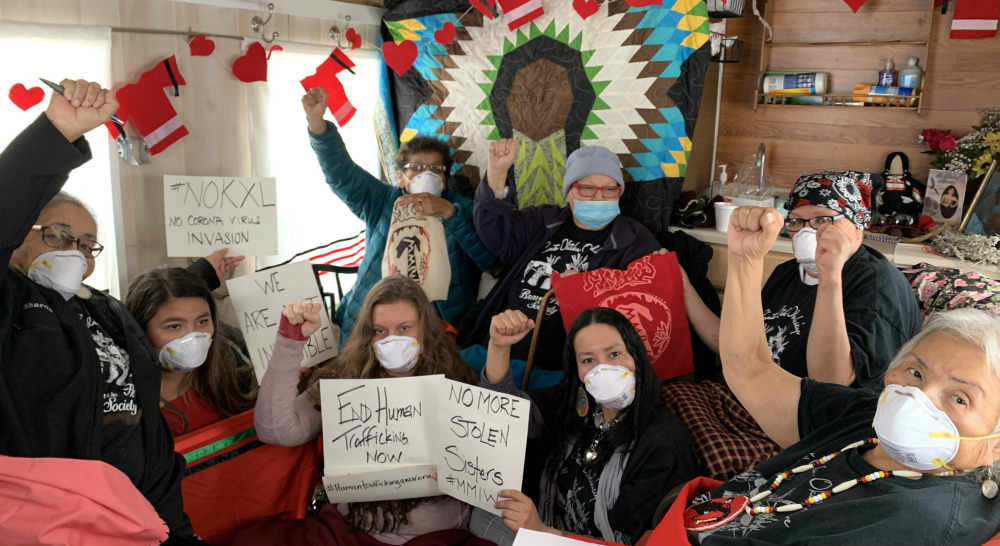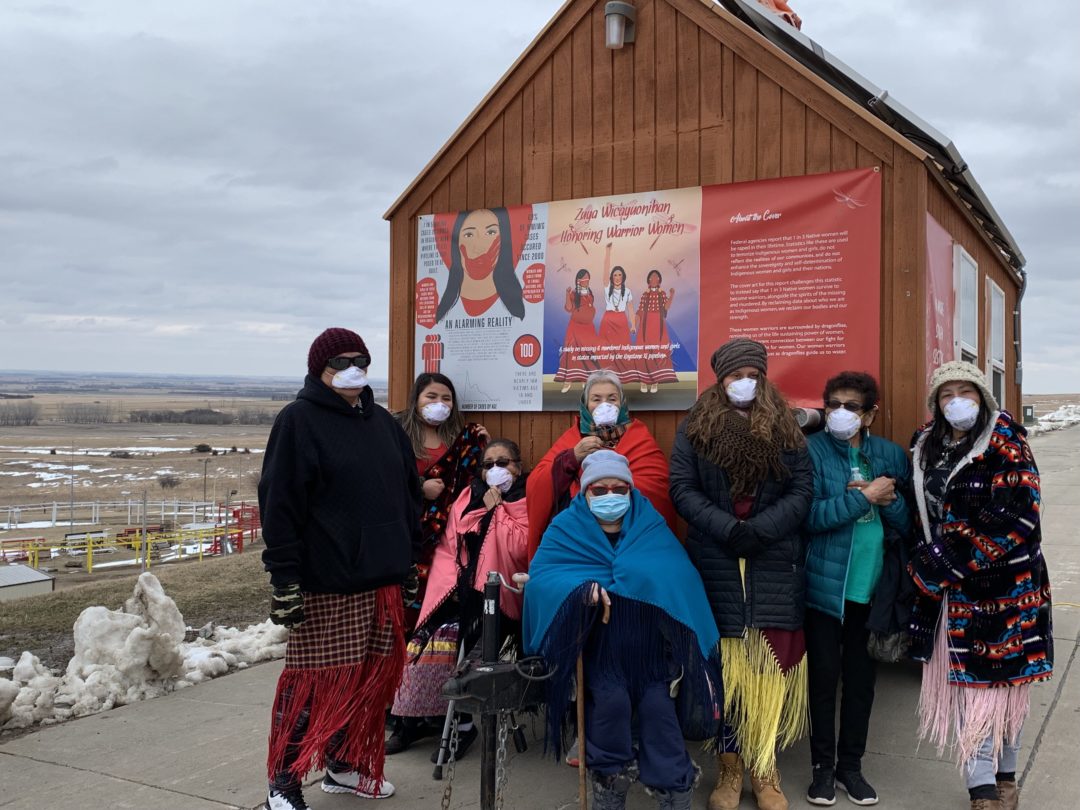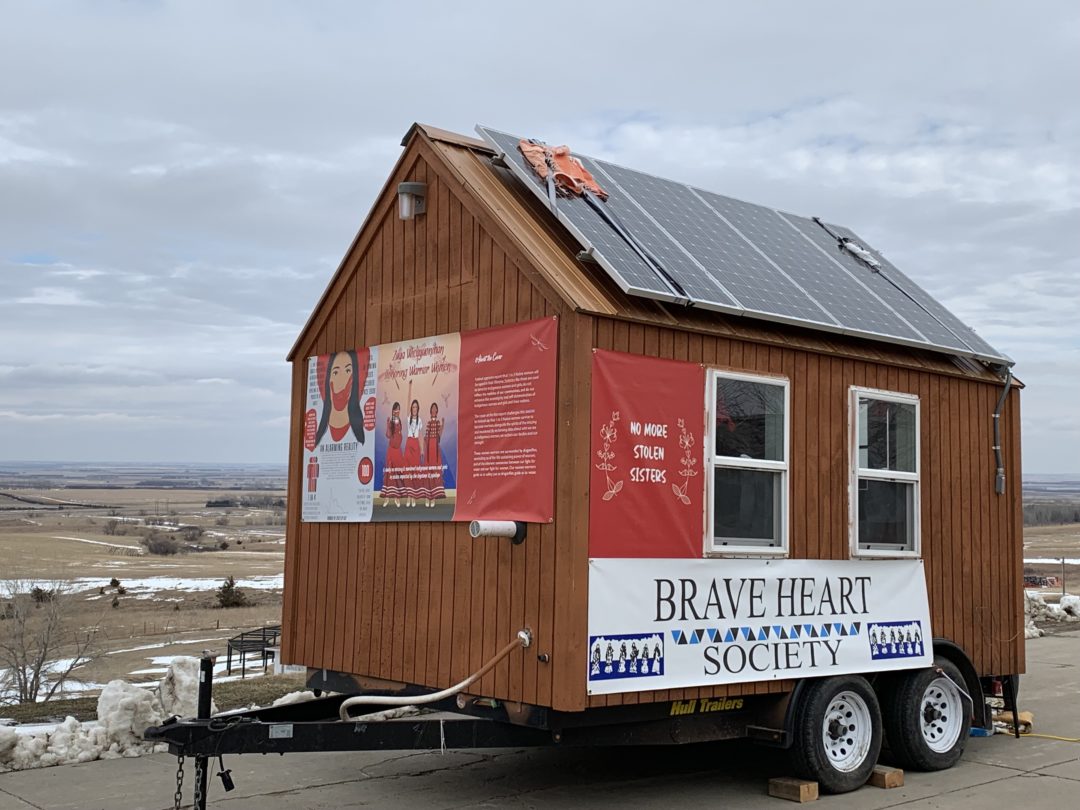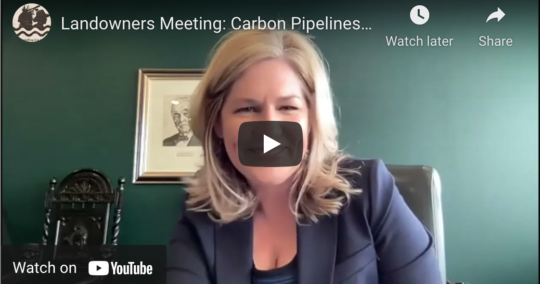

FOR IMMEDIATE RELEASE: March 19, 2020
Contacts:
Faith Spotted Eagle, Brave Heart Society, (605) 481-0416, eagletrax@hotmail.com
Frank James, Dakota Rural Action, (605) 697-5204 ext. 240, fejames@dakotarural.org
Lewis GrassRope, Wiconi Un Tipi, (605) 208-0880
“Standing Strong and Protecting” Tiny House Tour of Communities on Proposed
Keystone XL Pipeline Route Postponed Due to Coronavirus Health Threat
As coronavirus forces social distancing and community lockdowns, TC
Energy/TransCanada endangers thousands of workers and rural communities unequipped to handle public health threat, in addition to increased crime and sexual violence arising from pipeline worker “man camps”
Lake Andes, S.D. — Despite the worldwide Coronavirus pandemic, which has compelled Tribal, federal, state and local governments to impose “shelter-in-place,” travel restrictions, and cancel all manner of events to encourage social distancing, the Canadian pipeline corporation TC Energy (formerly TransCanada) announced to media on March 11 that against all good judgment it has begun moving forward with initial work on the Keystone XL project — further endangering the health of both thousands of out-of-state contract workers coming in to work on the pipeline, and the rural communities who will be exposed to them.
Due to the worldwide Coronavirus pandemic, the Brave Heart Society and the Promise to Protect, a national network of Native, rural and environmental justice groups, announced on Thursday the postponement of their “Standing Strong and Protecting” Tiny House Solar XL Tour of communities along the route of the proposed Keystone XL pipeline, which had been scheduled for March 15-21, 2020.
The tour is intended to raise community awareness of the dangers of increased crime and sexual violence posed by worker “mancamps” and RV locations — especially facing Indigenous women — to rural Tribal and local communities along the route of the proposed Keystone XL pipeline.
TC Energy plans to establish a half dozen “man camps” across Montana, South Dakota and Nebraska — temporary housing where hundreds or even thousands of pipeline workers would live together in close quarters throughout months of pipeline construction, in very small, very rural communities. Hospitals and Indian Health Services along the proposed route are already ill-equipped to deal with the Coronavirus public health threat, and must not be exposed to this additional strain and threats from the influx of hundreds or thousands of out-of-state workers that would accompany the launch of an unnecessary construction project like the Keystone XL pipeline.
Governments across the world are moving to cancel construction projects due to the Coronavirus public health threat, including the cities of Boston and San Francisco, Tesla’s auto factory, all Disneyland theme parks, and repairs at Notre Dame cathedral in Paris.
Out of respect for the recent travel bans enacted by Tribal Governments, and the ramping social distancing efforts being undertaken worldwide by local governments to fight Coronavirus, the “Standing Strong and Protecting” Tiny House Solar XL tour has postponed its travel to communities along the proposed Keystone XL route. The solar-equipped Tiny Safe House was set to embark from the Yankton Sioux Reservation and visit the Lower Brule Sioux Tribe, Rosebud Reservation, Takini School on the Cheyenne River Reservation, a site along I-90 where sex trafficking is known to happen, and a site in Nebraska, and then return to Yankton for a water & prayer ceremony. The “Standing Strong and Protecting” Tour will go forward at a later date to be determined. This is conditional on all communities inviting the tour to visit — after the Coronavirus public health threat has been contained.
Over the last two years, Brave Heart Society has partnered with Sovereign Bodies Institute to document the real-time incidents of MMIWG (Missing and Murdered Indigenous Women and Girls) across a four-states region, collecting figures and data. In December, an initial report of the findings was released entitled “Zuya Winyan Wicayuonihan,” honoring the warrior women who were killed. (Download a copy of the report.)
Along with its reckless endangerment of union and contract workers and rural communities by pushing forward with pre-construction activity on Keystone XL in the face of the Coronavirus pandemic, TC Energy has yet to even issue a final investment decision on the project. The company recently told investors that if it cannot “get comfort that the risk-reward proposition is attractive to us…the Keystone XL project will stay where it is.”
The company has also not yet secured all the required local, state and federal permits to move forward with Keystone XL, nor has it acquired all necessary easements from the landowners in Nebraska, who have dug in to challenge eminent domain seizures of their land in court. In addition, permits for the project issued by the Trump administration are currently facing three federal lawsuits which embroils TC Energy in further litigation, impeding the completion of the project.
“The threat of the man camps to our Native women stands, and we will remain vigilant. We send this strong message to the investors of the Keystone XL pipeline, reiterating that you are endangering our families now with a twin threat — to our women, and now our health through an uncontrolled virus. Not to mention, it also jeopardizes the health of your own workers,” the Brave Heart Society stated.
PHOTOS: View and download photos of Faith Spotted Eagle and Brave Heart Society members with the solar-equipped “Standing Strong and Protecting” Tiny House (downloadable for publication with attribution to photographer Jen Cohen.
https://drive.google.com/drive/folders/11jj10lRJeCTnNGRryR28qTpllaXFpm7M?usp=sharing
STATEMENTS:
“This causes eerie memories for us with the infected smallpox blankets that were distributed to tribes intentionally in the 1800’s,” said Faith Spotted Eagle, Brave Heart Society and Yankton Sioux Tribe. “It is absolutely similar, whereby we lost thousands of people in our tribes along the Missouri River where treaty water theft is occurring now. We shop in towns where these people will be located. We, as Indigenous people, populated these areas and continue to live in these towns, although we are constantly ignored by South Dakota state legislators. Now their towns will be endangered. We demand that TC Energy withdraw all construction which endangers our tribal health and neighbors personally and systemwide by bringing outsiders in from unions and who knows where. Do not dehumanize us with continued pipeline construction or mancamps or RVs. Stop now!”
“As our nation deals with the Coronavirus pandemic, we are in the continuous growth of manifest destiny. As TC Energy moves forward with this KXL pipeline, this egregious act only brings more of these pandemics to our Nation, heightening the epidemics we already face,” said Lewis GrassRope, Wiconi Un Tipi and Lower Brule Sioux Tribe. “These epidemics are MMIW, drugs, and both human and sex trafficking. Through our collective unity as caretakers and stewards of our Grandmother Earth, we will persevere for the betterment of our people and generations to come. Wiconi un tipi.”
“In order to slow the spread of the coronavirus, TC Energy should immediately stop all preparation work on the Keystone XL pipeline at this time,” said Paul Seamans, member of Dakota Rural Action and landowner on the proposed Keystone XL route near Draper, S.D. “It would be totally irresponsible of TC Energy to bring workers from around the country into our rural areas, increasing all our exposure to the virus. Our rural areas are some of the most underserved areas by the healthcare industry in the entire country. It is not uncommon for people to have to drive 50 to 150 miles to see a doctor. Our ambulance services are staffed by volunteers, and are usually understaffed and overworked. Our rural areas are just not set up to handle what a coronavirus outbreak might bring. The health and welfare of our local people is too important to put them at risk.”
“TC Energy’s greed is putting our communities and workers at risk,” said Jane Kleeb, founder of Bold Nebraska. “Given the bottoming out of oil prices, continued lawsuits at the local and federal level and basic public health safety, we call on TC Energy to end their reckless pursuit of a pipeline that will never be built.”
“Violence and Human Trafficking is and has been an epidemic in our communities with the arrival of soldiers and setting up forts such as Fort Thompson, Fort Randall and other places. These forts were breeding grounds for violence against Native women and human trafficking of our women and children. With the threat of Keystone XL and the man camps this will only exacerbate what we are already facing with what little resources we have in our tribal communities,” said Lisa Heth, Wiconi Wawokiya, Inc. (Helping Families).
“The blatant disregard for the health of all who populate our treaty lands in the proposed path of the Keystone XL pipeline is our call to action,” said Toy Lunderman, Sicangu MMIWG Taskforce and Rosebud Sioux Tribe. “We refuse to sit still and allow the greed of TC Energy to bring more violence to our people, especially our women and children. The Sicangu MMIWG Taskforce was created to lead this battle by speaking up and educating our people to stand and protect. Our people have walked through fire to protect our next generation. We are Sicangu. We will stand and protect as long as we are needed.”
“It is a moment when we must reassess all priorities and place health and safety of our communities first. Native communities have always been guided by an understanding of being in relationship with the natural world and all living beings. Due to COVID-19, many across the world are becoming aware of how we each share the responsibility for our collective health and safety. TC Energy is pursuing a policy driven by greed and a blatant disregard for the health of their workers and the peoples of our communities,” said Judith LeBlanc, Director, Native Organizers Alliance and member organization of the Promise to Protect.
“There is no good time to build a pipeline, and given the current pandemic, this is precisely the time to end the proposed construction of Keystone XL for the health and safety of communities,” said Kendall Mackey, Keep It In the Ground campaigner at 350.org. “While the ‘Standing Strong and Protecting’ Tiny House Tour has been postponed, the intention behind this Indigenous-led fight for justice and dignity remains. We must finally stop the epidemic of MMIW that is directly linked to the man camps built along the construction route, and we must halt this disastrous pipeline that only pollutes land, water, our climate, and breaches Indigenous sovereignty.”
“TC Energy is putting their workers and our communities at risk by recklessly moving forward with construction on the Keystone XL pipeline amid this public health crisis, when experts are urging us to isolate in order to protect people’s lives,” said Summer Nelson, Director of the Sierra Club Montana Chapter. “TC Energy executives aim to ram this disastrous tar sands project forward without addressing the many concerns of communities and tribes along the route, and at a time when we need everyone to work together to protect our communities. It is time for them to stand on the right side of history and abandon this costly, polluting project and protect public health.”
About Brave Heart Society:
The Brave Heart Society is the revival of a traditional cultural society for women and works tirelessly at “calling home the spirit of the culture.” In 1994, the Brave Heart Society was formed by a community of grandmothers on the Yankton Reservation in South Dakota. The Brave Heart Society, supervised by a group of community grandmothers called the Unci Circle, is dedicated to restoring endangered and lost cultural practices to heal the wounds endured by the Lakota, Nakota and Dakota peoples. This process of restoration is decidedly community-driven. Brave Heart Society, along with the Yankton Sioux Tribe and others, were signatories to the International Treaty to Protect the Sacred to Protect the Sacred From Tar Sands Projects, signed on Jan. 13, 2013, which gave rise to the revival of the “Cowboy Indian Alliance.”
Website: https://www.braveheartsociety.org/
About Promise to Protect:
To date, nearly 20,000 people have signed onto the “Promise to Protect” — a commitment to join a peaceful resistance along the Keystone XL pipeline route when called upon by Indigenous leaders and communities on the frontlines of the project. The “Promise to Protect” launched in November of 2017 immediately following the Nebraska Public Service Commission’s decision to approve the “alternative mainline route” for the pipeline after denying TransCanada’s preferred route. Website: https://nokxlpromise.org/
About Wiconi Un Tipi:
The focus of Wiconi Un Tipi (“The Way We Live When We Live In Community”) is not only pipeline resistance–it is a place to continue building on the indigenous culture, identity, and sovereignty that re-emerged in the Oceti Sakowin (Seven Council Fires) Camp at Standing Rock, as well as to build a resilient, sustainable community and forge enduring relationships and understanding with non-Native allies. Website: https://www.facebook.com/WiconiUnTipi/
About Native Organizers Alliance:
The Native Organizers Alliance is a training and organizing network dedicated to building the capacity of Native tribes, traditional societies, and community groups to make transformational change. It also provides a forum for Native leaders and organizers to work in collaboration with each other and promote their work with non-Native national allies. Website: http://nativeorganizing.org/about-us/
About Dakota Rural Action:
Dakota Rural Action is a grassroots, family agriculture and conservation group that organizes South Dakotans to protect our family farmers and ranchers, natural resources and unique way of life. Website: https://www.dakotarural.org/
About Bold Nebraska:
Bold Nebraska is best known for our work with an unlikely alliance of farmers, ranchers, Tribal Nations and citizens to stop the risky Keystone XL pipeline. We work on issues including eminent domain, clean energy, small family farms and lifting up small businesses who represent the Good Life. You can find us in the streets, corn fields and in the State Capitol standing up for property rights and standing with citizens as we work to protect the land, water and climate. Website: https://boldnebraska.org
# # #
Mancamps Report Zuya Winyan Wicayuonihan-honoring Warrior Women









